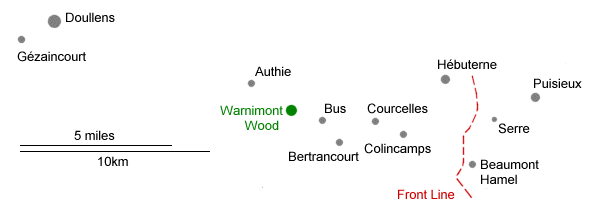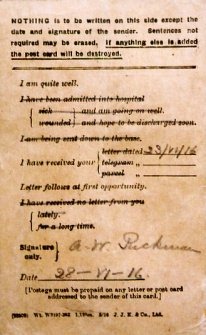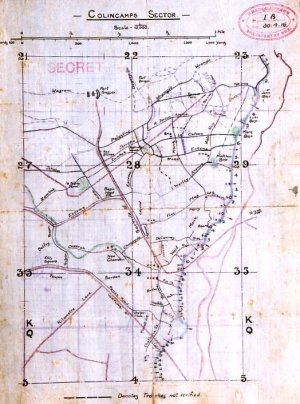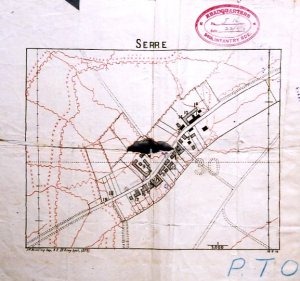
On Saturday 11th March 1916, the Accrington Pals left the train which had carried them for 48 hours from Marseilles to Pont Rémy Station, and marched to billets in the village of Huppy. "At the end of our railway journey the officers and advance guard found us all billets in a pretty little village, though with no comparison to our Carnarvon billets. We are as comfortable as may be in barns, stables, outhouses, etc. Six of us are in a kind of outhouse belonging to a farm. There are plenty of rats knocking about, but we take no notice of them. We had for dinner on Sunday tinned meat, potatoes, carrots, etc., and they make a jolly good meal."1 The stifling hot climate of Egypt was soon but a distant memory. In the fourth week of March, temperatures fell below freezing point, with heavy snow to follow. Huppy may not have stood comparison to Caernarvon, but the villagers would boil eggs, toast bread, and even provide coffee laced with rum to the troops in exchange for a few coppers.2 Rumours of approaching home leave helped to revive spirits further. The battalion gradually moved up towards the trenches, reaching the village of Colincamps on 4th April.  "We are still in billets. These consist principally of barns, with wire beds permanently erected therein for troops. Our shanty is fairly comfortable, even if it has neither doors nor windows in, and one wall looks as though it had been well bombarded. There are plenty of rats about, but these don't bother us. I dip well under the blankets and sleep soundly. The weather we are having seems to be much the same as yours. Last week was rather warmer and more Spring-like. Furloughs are going on slowly. Only two from each Company (10 from the battalion) are balloted for whenever a "leave" train is despatched, so it will be 1917 before some of us arrive.....I had my first bath yesterday since arriving in this country. It was in hot water, too, and was simply delightful."3
After 8 days at Colincamps, the battalion moved back into Divisional Reserve at Bertrancourt. Most of the following 15 days saw men detailed to join working parties in the front or reserve trenches, or to carry stores and ammunition up to the line.
"A working party by night was a miserable affair. Digging or revetting when you could scarcely see what you were doing resulted in very little being accomplished; often the walk to and from the work was a very long one; and even with people trying to do a job of work it seemed very doubtful whether a working party was worth while at all. Carrying parties were rather different; they did get something done, but some of the work was desperately hard. Only those who have tried to carry up to the line a trench-mortar shell along uneven and muddy trenches, probably with an occasional slip into a sump hole, can realize what it was like."5 On the afternoon of 28th April, the Accrington Pals took over a stretch of front line between Beaumont Hamel and Serre. Their first fatalities in action came when, at 11.30pm on the 29th, the right of the battalion line was bombarded by enemy artillery fire. Pte. Fred Sayer of Z (Burnley) Company was standing alongside Capt. Riley in the second line when word came back that men had been buried in a trench blown-in by shellfire. Sayer, first on the scene, dug away at the earth with his entrenching tool: "Scratching and scraping the earth away exposed sufficient of the first man for me to know that he was dead. The second man however was alive and by sitting cross-legged on the surface I was able to move enough earth to drag him from the sticky mess. The dead man was 20-year old Pte. Jack Clark of Burnley.7 On the same night, 24-year-old Pte. Arthur Riley of Accrington was fatally wounded by shrapnel, dying the following day at a Casualty Clearing Station; an unposted letter to his mother, written before the battalion went into the line, was forwarded by a Sergeant of the R.A.M.C.: "By the time you get this I fancy we shall have done here, and won't Accrington people be glad to hear the "Pals" are in the trenches at last, but I don't mind telling you that we have been doing much dangerous work while we have been here. We have been out in awful weather and all we get is "Aren't the 'Pals' in the trenches yet?""8 On 6th May, the battalion went into Divisional Reserve at Warnimont Wood. Casualties had been relatively light during this first tour of the front line; 2 had been killed, 1 had died of wounds, and 14 had been wounded, 2 of whom remained at duty. "In May the Battalion moved into some tarpaulin huts in [Warnimont Wood]. Spring was in the air and the leaves on the trees were showing. What a delight after the mud, cold and filth of the trenches. Men were able to clean their bodies and clothes and equipment, and lice were slain by the thousand and comfort obtained. Working parties still went forth each night. The woods brought peace and men were able to sit and enjoy the sunshine."9 By this time, a lucky few had been granted a week's home leave. The Accrington Observer & Times of 1st April reported: "Several members of the Accrington "Pals" battalion, looking well bronzed and exceedingly "fit" have within the last few days been home on leave."
From 20th to 30th May, the Pals held the front line opposite the village of Serre.10 The battalion worked on improvement of the front line trench, and sent out wiring parties every night. "One thing that is very nerve trying is "standing to". Firing goes on all day and when it stops everybody "stands to". This lasts for about an hour and a half; its terrible. There is no moving about and you are always expecting an attack. A chap is told to "shut up" if he talks above a whisper. You imagine all sorts of things. It is then you see what is known as "trench stare" - chaps eyes bulging out of their heads, giving you the impression that they are going mad. It's a great relief when the order "stand down" is given. By that time it's safe for a sentry to get up in each bay. Then machine guns start cracking - sweeping the front. Casualties during this ten-day tour amounted to 2 killed and 23 wounded. On being relieved, the battalion moved to Brigade Reserve in Courcelles. The men were by now receiving "comforts" sent from their home towns. In a letter published in the Accrington Gazette of 3rd June, Capt. John Harwood listed items that had been provided for the Pals by subscribers to the "Comfort Fund": 200 cap badges, canvas covers for both rifles and machine guns, 16 pieces of band music, 500 tins of cocoa for use in the trenches, 8 footballs, 800 pairs of socks, special stores to the value of £4 8s 7d (£4.43), and 144 safety razors. The "comforts" were well appreciated: "The lads have done awfully well, and are as cheery and as proud of themselves as when they first left England, and they have had to rough it. The cocoa that has been sent was very much appreciated, and the men like it very much, especially in the early morning. The socks will also be very useful when they arrive, as socks go so quickly out here."12 On 5th June, the battalion marched to Gézaincourt where, over the following week, it took part in special training for the forthcoming Somme offensive, rehearsing its attack over ground on which the German trench system around Serre had been marked out with flags and tapes. The Pals' commanding officer, Lt.-Col. Arthur Rickman, temporarily in command of the brigade13, would have had a better idea than most of the enormity of the task that faced his battalion; early in June, he remarked to Harwood that "a hundred or two wire-cutters would come in very useful." There was a further spell in Warnimont Wood before the battalion returned to the front line on 19th June. Casualties escalated in this last tour before the offensive; 12 were killed and 24 wounded in the 4 days before the battalion was relieved on the night of 23rd/24th June. As the number of casualties rose, and as the unfit and under-age were, as far as possible, withdrawn, there developed a need for replacements. 78 other ranks had transferred from the Army Cyclist Corps on 25th May; a further 58 men reported for duty from the 12th Battalion as late as 24th June. Lt. Lewis and 2/Lts. Shorrock, Clegg, Endean and Davies had joined on 23rd April; Lts. Hitchon, Gay and Williams, and 2/Lt. Lett reported for duty on 17th June; 2/Lt. Ritchie arrived from the Army Cyclist Corps on 24th June. In the early evening of 30th June, the Accrington Pals left Warnimont Wood to take up their positions in the assembly trenches opposite Serre. The fateful hour was at hand.
© Andrew C Jackson 2004. Compiled from "The History of the East Lancashire Regiment in the Great War" edited by Major General Sir N. Nicholson, TNA document WO95/2366, and quoted sources.
|



